Religious Objection to Blood Transfusion and Nursing Practice
VerifiedAdded on 2022/12/29
|9
|2957
|56
Report
AI Summary
This report investigates the religious objections to blood transfusions, particularly focusing on the implications for nursing practice. It begins by introducing the issue, emphasizing cultural safety variables, and highlighting the perspectives of groups like Jehovah's Witnesses who object to blood transfusions based on religious beliefs. The paper then critically evaluates the evidence, summarizing the effects of these objections on culturally respectful clinical practice, including patient safety and the challenges faced by healthcare professionals. It explores the religious basis for these objections, referencing relevant biblical verses and explaining the resultant impact on healthcare treatment. The report also discusses the importance of cultural competency in addressing these issues, advocating for alternative treatment options and respecting patient beliefs. It concludes by providing recommendations for healthcare professionals to navigate these situations, emphasizing the need for understanding, respect, and the exploration of alternative treatment methods. The report aims to enhance the quality of patient care while respecting diverse religious and cultural beliefs.
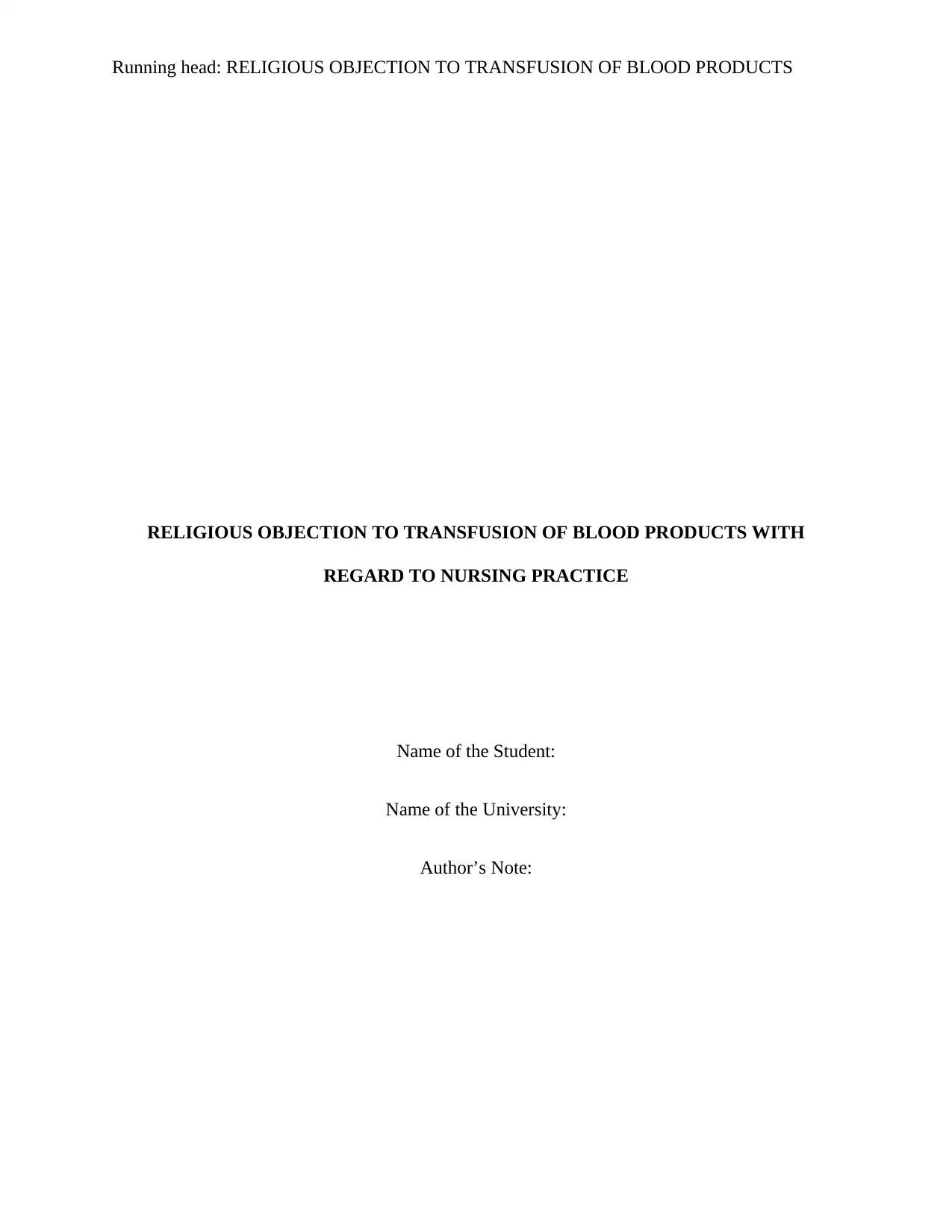
Running head: RELIGIOUS OBJECTION TO TRANSFUSION OF BLOOD PRODUCTS
RELIGIOUS OBJECTION TO TRANSFUSION OF BLOOD PRODUCTS WITH
REGARD TO NURSING PRACTICE
Name of the Student:
Name of the University:
Author’s Note:
RELIGIOUS OBJECTION TO TRANSFUSION OF BLOOD PRODUCTS WITH
REGARD TO NURSING PRACTICE
Name of the Student:
Name of the University:
Author’s Note:
Paraphrase This Document
Need a fresh take? Get an instant paraphrase of this document with our AI Paraphraser
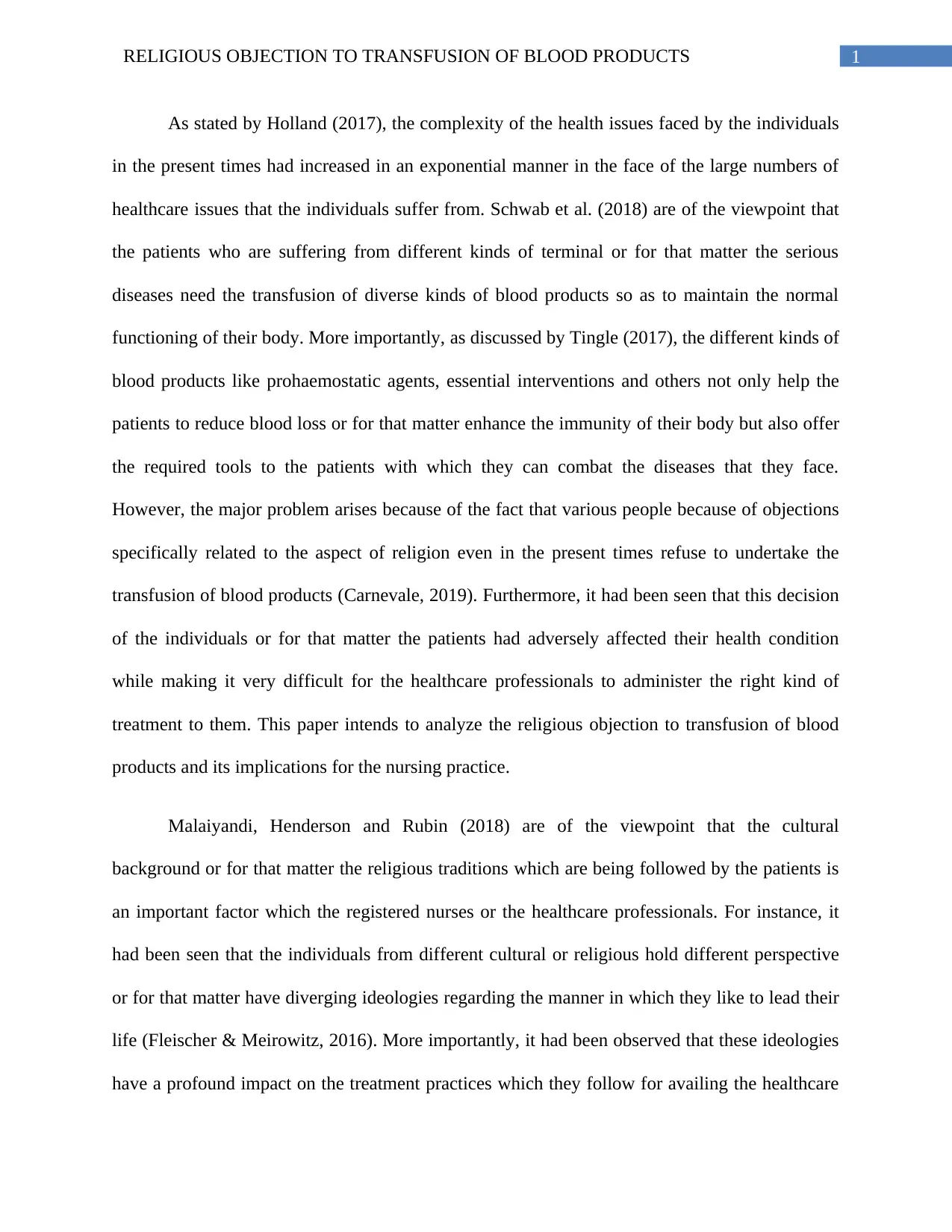
1RELIGIOUS OBJECTION TO TRANSFUSION OF BLOOD PRODUCTS
As stated by Holland (2017), the complexity of the health issues faced by the individuals
in the present times had increased in an exponential manner in the face of the large numbers of
healthcare issues that the individuals suffer from. Schwab et al. (2018) are of the viewpoint that
the patients who are suffering from different kinds of terminal or for that matter the serious
diseases need the transfusion of diverse kinds of blood products so as to maintain the normal
functioning of their body. More importantly, as discussed by Tingle (2017), the different kinds of
blood products like prohaemostatic agents, essential interventions and others not only help the
patients to reduce blood loss or for that matter enhance the immunity of their body but also offer
the required tools to the patients with which they can combat the diseases that they face.
However, the major problem arises because of the fact that various people because of objections
specifically related to the aspect of religion even in the present times refuse to undertake the
transfusion of blood products (Carnevale, 2019). Furthermore, it had been seen that this decision
of the individuals or for that matter the patients had adversely affected their health condition
while making it very difficult for the healthcare professionals to administer the right kind of
treatment to them. This paper intends to analyze the religious objection to transfusion of blood
products and its implications for the nursing practice.
Malaiyandi, Henderson and Rubin (2018) are of the viewpoint that the cultural
background or for that matter the religious traditions which are being followed by the patients is
an important factor which the registered nurses or the healthcare professionals. For instance, it
had been seen that the individuals from different cultural or religious hold different perspective
or for that matter have diverging ideologies regarding the manner in which they like to lead their
life (Fleischer & Meirowitz, 2016). More importantly, it had been observed that these ideologies
have a profound impact on the treatment practices which they follow for availing the healthcare
As stated by Holland (2017), the complexity of the health issues faced by the individuals
in the present times had increased in an exponential manner in the face of the large numbers of
healthcare issues that the individuals suffer from. Schwab et al. (2018) are of the viewpoint that
the patients who are suffering from different kinds of terminal or for that matter the serious
diseases need the transfusion of diverse kinds of blood products so as to maintain the normal
functioning of their body. More importantly, as discussed by Tingle (2017), the different kinds of
blood products like prohaemostatic agents, essential interventions and others not only help the
patients to reduce blood loss or for that matter enhance the immunity of their body but also offer
the required tools to the patients with which they can combat the diseases that they face.
However, the major problem arises because of the fact that various people because of objections
specifically related to the aspect of religion even in the present times refuse to undertake the
transfusion of blood products (Carnevale, 2019). Furthermore, it had been seen that this decision
of the individuals or for that matter the patients had adversely affected their health condition
while making it very difficult for the healthcare professionals to administer the right kind of
treatment to them. This paper intends to analyze the religious objection to transfusion of blood
products and its implications for the nursing practice.
Malaiyandi, Henderson and Rubin (2018) are of the viewpoint that the cultural
background or for that matter the religious traditions which are being followed by the patients is
an important factor which the registered nurses or the healthcare professionals. For instance, it
had been seen that the individuals from different cultural or religious hold different perspective
or for that matter have diverging ideologies regarding the manner in which they like to lead their
life (Fleischer & Meirowitz, 2016). More importantly, it had been observed that these ideologies
have a profound impact on the treatment practices which they follow for availing the healthcare
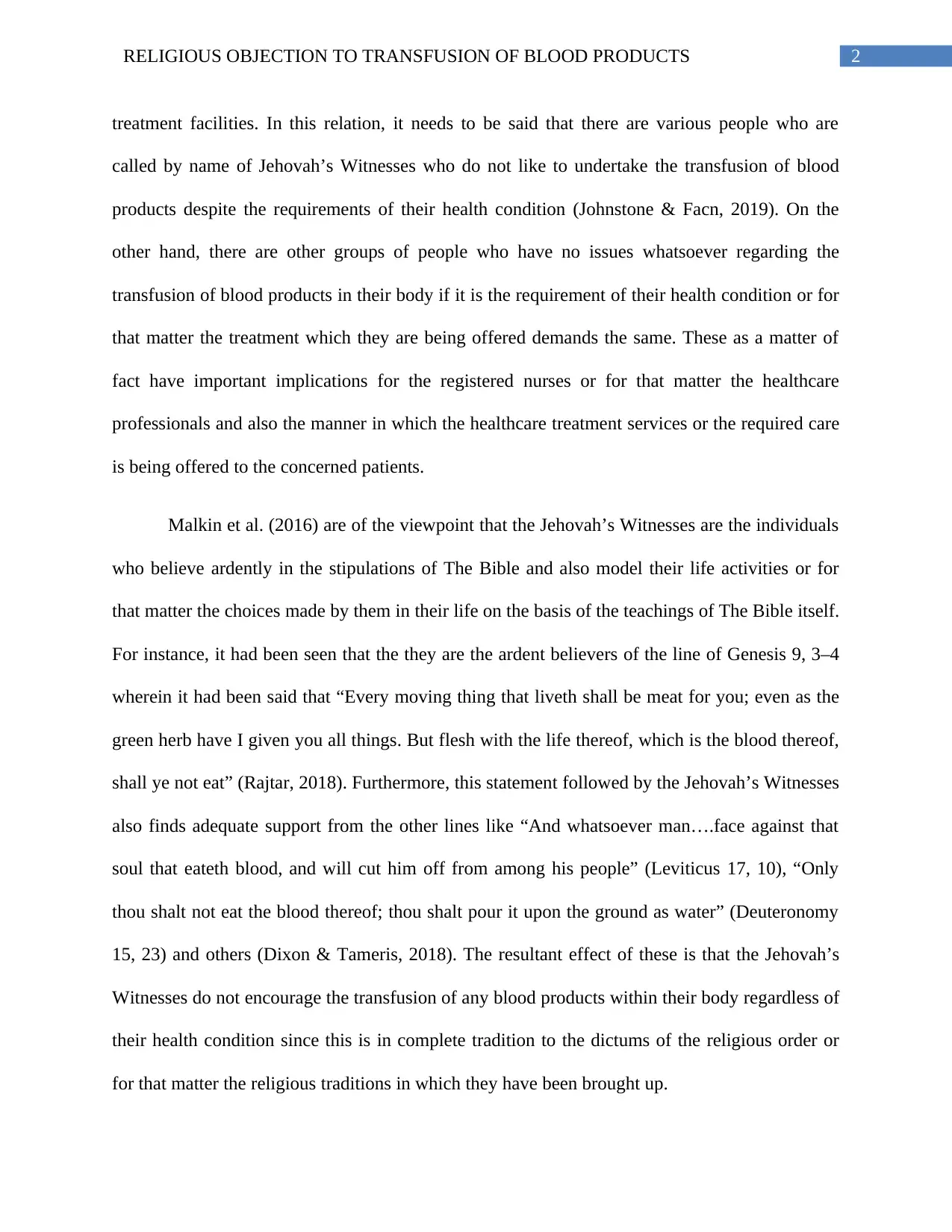
2RELIGIOUS OBJECTION TO TRANSFUSION OF BLOOD PRODUCTS
treatment facilities. In this relation, it needs to be said that there are various people who are
called by name of Jehovah’s Witnesses who do not like to undertake the transfusion of blood
products despite the requirements of their health condition (Johnstone & Facn, 2019). On the
other hand, there are other groups of people who have no issues whatsoever regarding the
transfusion of blood products in their body if it is the requirement of their health condition or for
that matter the treatment which they are being offered demands the same. These as a matter of
fact have important implications for the registered nurses or for that matter the healthcare
professionals and also the manner in which the healthcare treatment services or the required care
is being offered to the concerned patients.
Malkin et al. (2016) are of the viewpoint that the Jehovah’s Witnesses are the individuals
who believe ardently in the stipulations of The Bible and also model their life activities or for
that matter the choices made by them in their life on the basis of the teachings of The Bible itself.
For instance, it had been seen that the they are the ardent believers of the line of Genesis 9, 3–4
wherein it had been said that “Every moving thing that liveth shall be meat for you; even as the
green herb have I given you all things. But flesh with the life thereof, which is the blood thereof,
shall ye not eat” (Rajtar, 2018). Furthermore, this statement followed by the Jehovah’s Witnesses
also finds adequate support from the other lines like “And whatsoever man….face against that
soul that eateth blood, and will cut him off from among his people” (Leviticus 17, 10), “Only
thou shalt not eat the blood thereof; thou shalt pour it upon the ground as water” (Deuteronomy
15, 23) and others (Dixon & Tameris, 2018). The resultant effect of these is that the Jehovah’s
Witnesses do not encourage the transfusion of any blood products within their body regardless of
their health condition since this is in complete tradition to the dictums of the religious order or
for that matter the religious traditions in which they have been brought up.
treatment facilities. In this relation, it needs to be said that there are various people who are
called by name of Jehovah’s Witnesses who do not like to undertake the transfusion of blood
products despite the requirements of their health condition (Johnstone & Facn, 2019). On the
other hand, there are other groups of people who have no issues whatsoever regarding the
transfusion of blood products in their body if it is the requirement of their health condition or for
that matter the treatment which they are being offered demands the same. These as a matter of
fact have important implications for the registered nurses or for that matter the healthcare
professionals and also the manner in which the healthcare treatment services or the required care
is being offered to the concerned patients.
Malkin et al. (2016) are of the viewpoint that the Jehovah’s Witnesses are the individuals
who believe ardently in the stipulations of The Bible and also model their life activities or for
that matter the choices made by them in their life on the basis of the teachings of The Bible itself.
For instance, it had been seen that the they are the ardent believers of the line of Genesis 9, 3–4
wherein it had been said that “Every moving thing that liveth shall be meat for you; even as the
green herb have I given you all things. But flesh with the life thereof, which is the blood thereof,
shall ye not eat” (Rajtar, 2018). Furthermore, this statement followed by the Jehovah’s Witnesses
also finds adequate support from the other lines like “And whatsoever man….face against that
soul that eateth blood, and will cut him off from among his people” (Leviticus 17, 10), “Only
thou shalt not eat the blood thereof; thou shalt pour it upon the ground as water” (Deuteronomy
15, 23) and others (Dixon & Tameris, 2018). The resultant effect of these is that the Jehovah’s
Witnesses do not encourage the transfusion of any blood products within their body regardless of
their health condition since this is in complete tradition to the dictums of the religious order or
for that matter the religious traditions in which they have been brought up.
⊘ This is a preview!⊘
Do you want full access?
Subscribe today to unlock all pages.

Trusted by 1+ million students worldwide
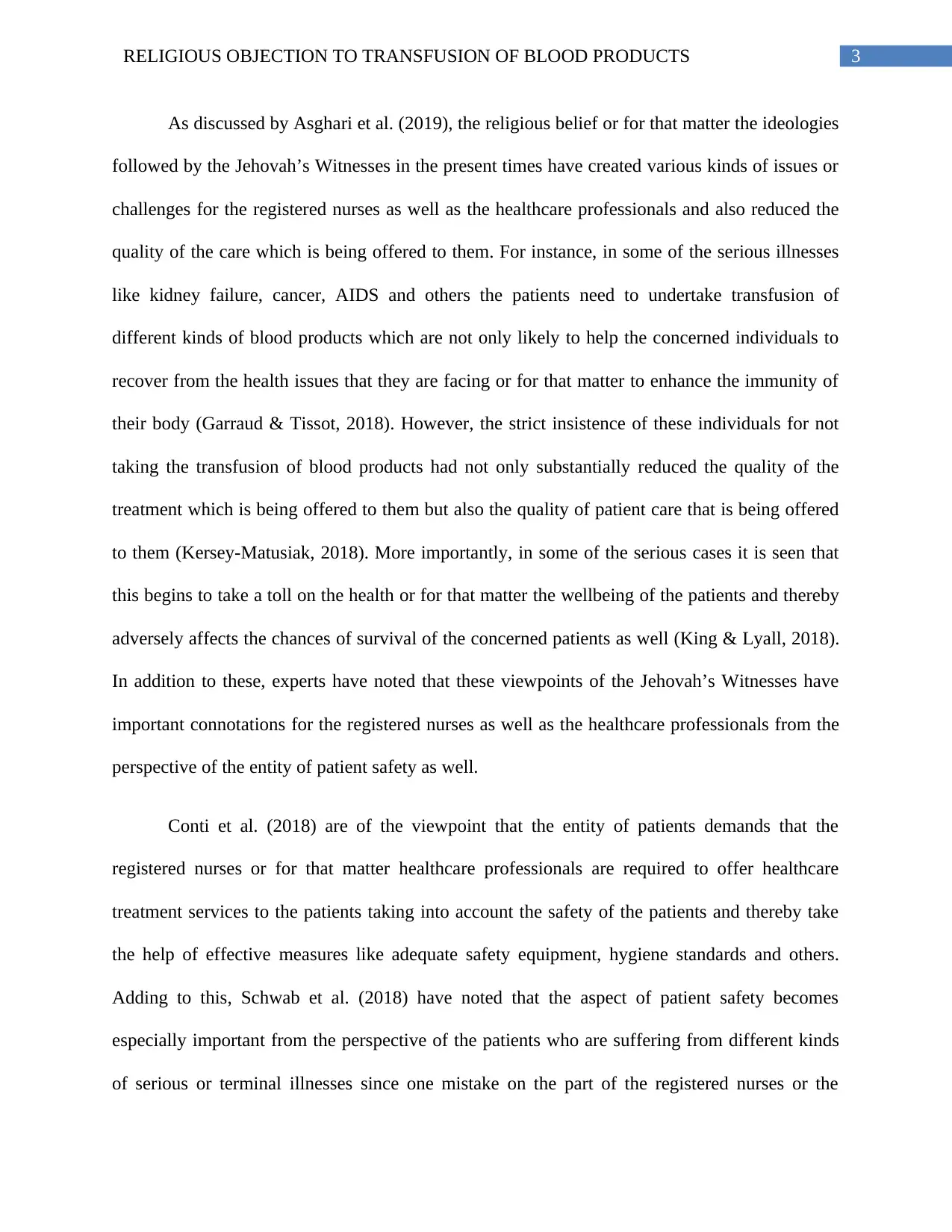
3RELIGIOUS OBJECTION TO TRANSFUSION OF BLOOD PRODUCTS
As discussed by Asghari et al. (2019), the religious belief or for that matter the ideologies
followed by the Jehovah’s Witnesses in the present times have created various kinds of issues or
challenges for the registered nurses as well as the healthcare professionals and also reduced the
quality of the care which is being offered to them. For instance, in some of the serious illnesses
like kidney failure, cancer, AIDS and others the patients need to undertake transfusion of
different kinds of blood products which are not only likely to help the concerned individuals to
recover from the health issues that they are facing or for that matter to enhance the immunity of
their body (Garraud & Tissot, 2018). However, the strict insistence of these individuals for not
taking the transfusion of blood products had not only substantially reduced the quality of the
treatment which is being offered to them but also the quality of patient care that is being offered
to them (Kersey-Matusiak, 2018). More importantly, in some of the serious cases it is seen that
this begins to take a toll on the health or for that matter the wellbeing of the patients and thereby
adversely affects the chances of survival of the concerned patients as well (King & Lyall, 2018).
In addition to these, experts have noted that these viewpoints of the Jehovah’s Witnesses have
important connotations for the registered nurses as well as the healthcare professionals from the
perspective of the entity of patient safety as well.
Conti et al. (2018) are of the viewpoint that the entity of patients demands that the
registered nurses or for that matter healthcare professionals are required to offer healthcare
treatment services to the patients taking into account the safety of the patients and thereby take
the help of effective measures like adequate safety equipment, hygiene standards and others.
Adding to this, Schwab et al. (2018) have noted that the aspect of patient safety becomes
especially important from the perspective of the patients who are suffering from different kinds
of serious or terminal illnesses since one mistake on the part of the registered nurses or the
As discussed by Asghari et al. (2019), the religious belief or for that matter the ideologies
followed by the Jehovah’s Witnesses in the present times have created various kinds of issues or
challenges for the registered nurses as well as the healthcare professionals and also reduced the
quality of the care which is being offered to them. For instance, in some of the serious illnesses
like kidney failure, cancer, AIDS and others the patients need to undertake transfusion of
different kinds of blood products which are not only likely to help the concerned individuals to
recover from the health issues that they are facing or for that matter to enhance the immunity of
their body (Garraud & Tissot, 2018). However, the strict insistence of these individuals for not
taking the transfusion of blood products had not only substantially reduced the quality of the
treatment which is being offered to them but also the quality of patient care that is being offered
to them (Kersey-Matusiak, 2018). More importantly, in some of the serious cases it is seen that
this begins to take a toll on the health or for that matter the wellbeing of the patients and thereby
adversely affects the chances of survival of the concerned patients as well (King & Lyall, 2018).
In addition to these, experts have noted that these viewpoints of the Jehovah’s Witnesses have
important connotations for the registered nurses as well as the healthcare professionals from the
perspective of the entity of patient safety as well.
Conti et al. (2018) are of the viewpoint that the entity of patients demands that the
registered nurses or for that matter healthcare professionals are required to offer healthcare
treatment services to the patients taking into account the safety of the patients and thereby take
the help of effective measures like adequate safety equipment, hygiene standards and others.
Adding to this, Schwab et al. (2018) have noted that the aspect of patient safety becomes
especially important from the perspective of the patients who are suffering from different kinds
of serious or terminal illnesses since one mistake on the part of the registered nurses or the
Paraphrase This Document
Need a fresh take? Get an instant paraphrase of this document with our AI Paraphraser
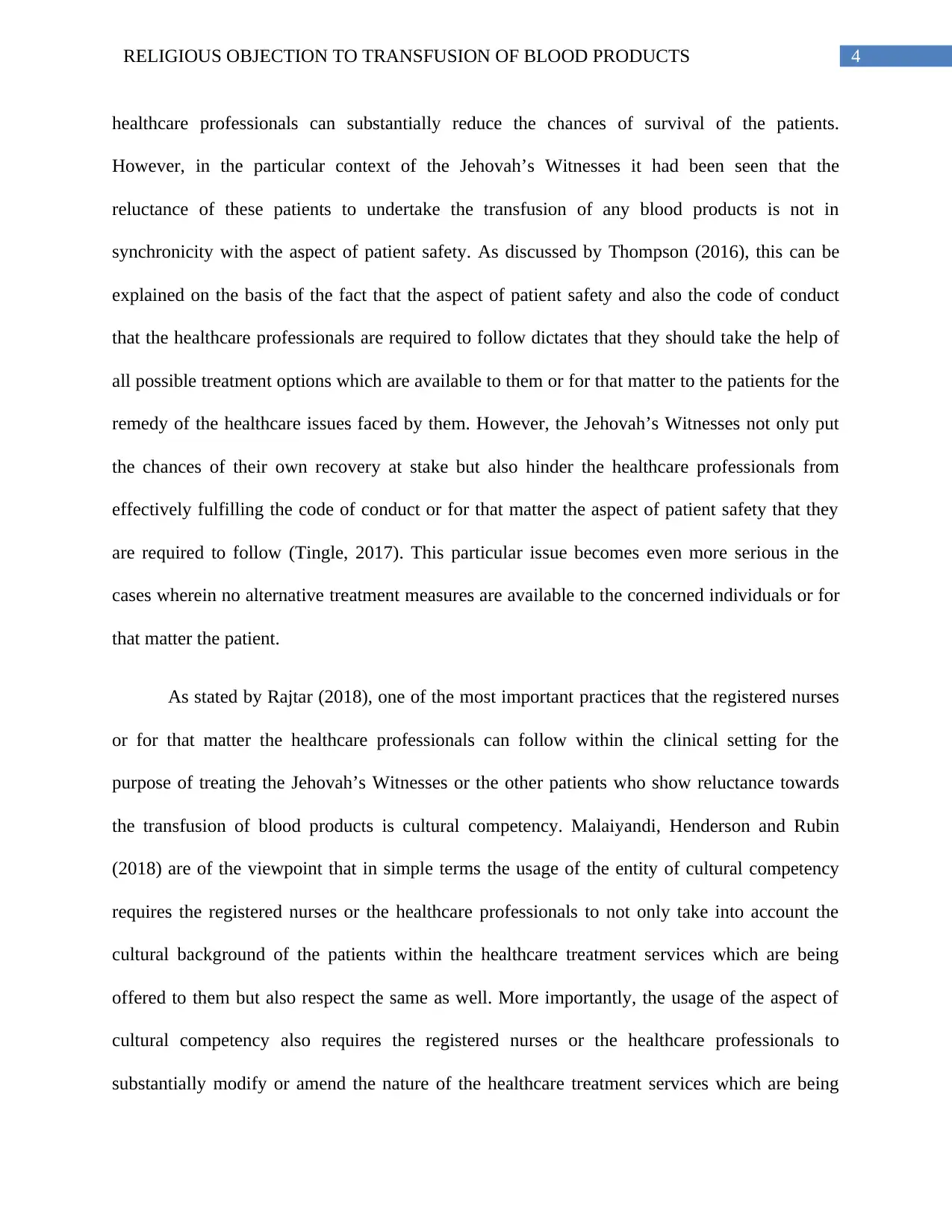
4RELIGIOUS OBJECTION TO TRANSFUSION OF BLOOD PRODUCTS
healthcare professionals can substantially reduce the chances of survival of the patients.
However, in the particular context of the Jehovah’s Witnesses it had been seen that the
reluctance of these patients to undertake the transfusion of any blood products is not in
synchronicity with the aspect of patient safety. As discussed by Thompson (2016), this can be
explained on the basis of the fact that the aspect of patient safety and also the code of conduct
that the healthcare professionals are required to follow dictates that they should take the help of
all possible treatment options which are available to them or for that matter to the patients for the
remedy of the healthcare issues faced by them. However, the Jehovah’s Witnesses not only put
the chances of their own recovery at stake but also hinder the healthcare professionals from
effectively fulfilling the code of conduct or for that matter the aspect of patient safety that they
are required to follow (Tingle, 2017). This particular issue becomes even more serious in the
cases wherein no alternative treatment measures are available to the concerned individuals or for
that matter the patient.
As stated by Rajtar (2018), one of the most important practices that the registered nurses
or for that matter the healthcare professionals can follow within the clinical setting for the
purpose of treating the Jehovah’s Witnesses or the other patients who show reluctance towards
the transfusion of blood products is cultural competency. Malaiyandi, Henderson and Rubin
(2018) are of the viewpoint that in simple terms the usage of the entity of cultural competency
requires the registered nurses or the healthcare professionals to not only take into account the
cultural background of the patients within the healthcare treatment services which are being
offered to them but also respect the same as well. More importantly, the usage of the aspect of
cultural competency also requires the registered nurses or the healthcare professionals to
substantially modify or amend the nature of the healthcare treatment services which are being
healthcare professionals can substantially reduce the chances of survival of the patients.
However, in the particular context of the Jehovah’s Witnesses it had been seen that the
reluctance of these patients to undertake the transfusion of any blood products is not in
synchronicity with the aspect of patient safety. As discussed by Thompson (2016), this can be
explained on the basis of the fact that the aspect of patient safety and also the code of conduct
that the healthcare professionals are required to follow dictates that they should take the help of
all possible treatment options which are available to them or for that matter to the patients for the
remedy of the healthcare issues faced by them. However, the Jehovah’s Witnesses not only put
the chances of their own recovery at stake but also hinder the healthcare professionals from
effectively fulfilling the code of conduct or for that matter the aspect of patient safety that they
are required to follow (Tingle, 2017). This particular issue becomes even more serious in the
cases wherein no alternative treatment measures are available to the concerned individuals or for
that matter the patient.
As stated by Rajtar (2018), one of the most important practices that the registered nurses
or for that matter the healthcare professionals can follow within the clinical setting for the
purpose of treating the Jehovah’s Witnesses or the other patients who show reluctance towards
the transfusion of blood products is cultural competency. Malaiyandi, Henderson and Rubin
(2018) are of the viewpoint that in simple terms the usage of the entity of cultural competency
requires the registered nurses or the healthcare professionals to not only take into account the
cultural background of the patients within the healthcare treatment services which are being
offered to them but also respect the same as well. More importantly, the usage of the aspect of
cultural competency also requires the registered nurses or the healthcare professionals to
substantially modify or amend the nature of the healthcare treatment services which are being
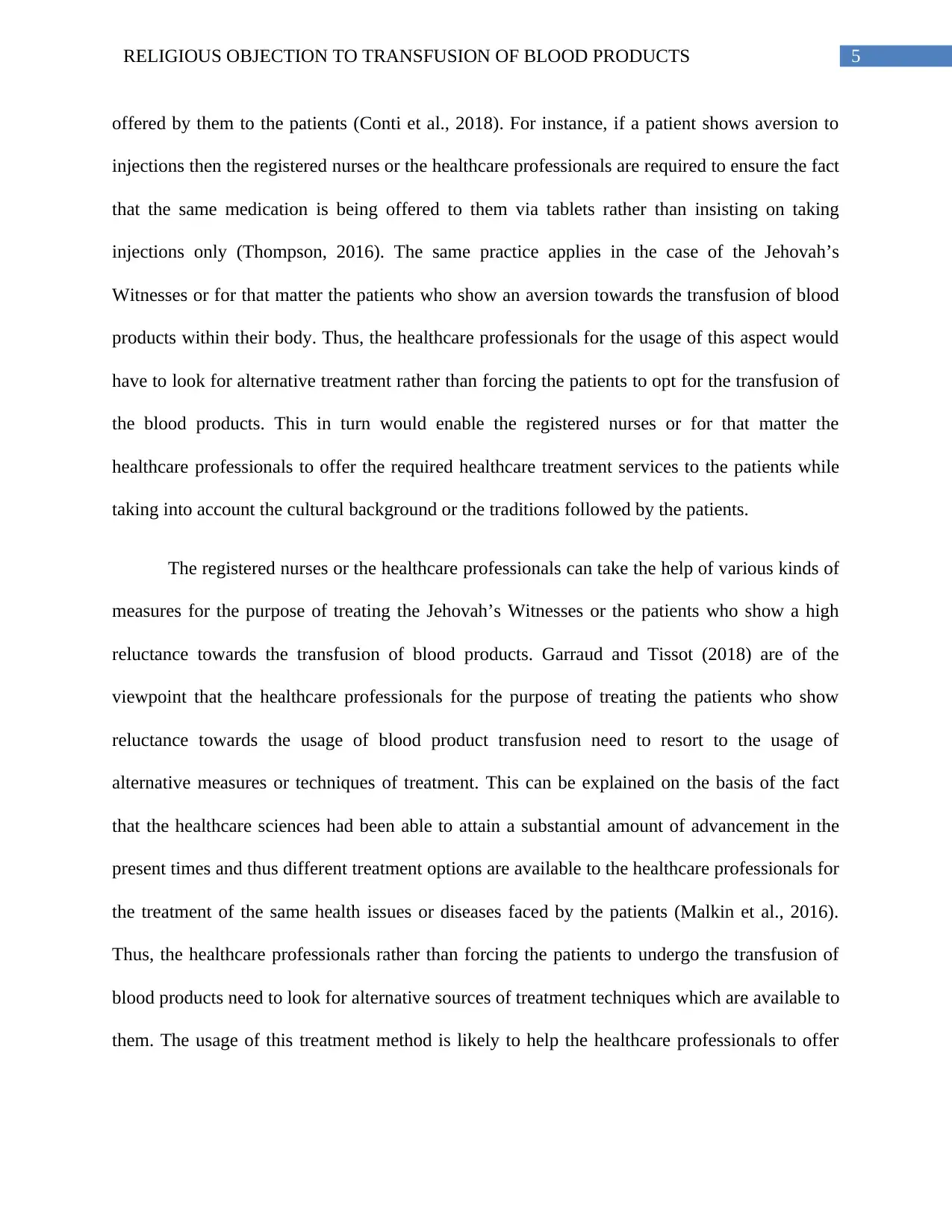
5RELIGIOUS OBJECTION TO TRANSFUSION OF BLOOD PRODUCTS
offered by them to the patients (Conti et al., 2018). For instance, if a patient shows aversion to
injections then the registered nurses or the healthcare professionals are required to ensure the fact
that the same medication is being offered to them via tablets rather than insisting on taking
injections only (Thompson, 2016). The same practice applies in the case of the Jehovah’s
Witnesses or for that matter the patients who show an aversion towards the transfusion of blood
products within their body. Thus, the healthcare professionals for the usage of this aspect would
have to look for alternative treatment rather than forcing the patients to opt for the transfusion of
the blood products. This in turn would enable the registered nurses or for that matter the
healthcare professionals to offer the required healthcare treatment services to the patients while
taking into account the cultural background or the traditions followed by the patients.
The registered nurses or the healthcare professionals can take the help of various kinds of
measures for the purpose of treating the Jehovah’s Witnesses or the patients who show a high
reluctance towards the transfusion of blood products. Garraud and Tissot (2018) are of the
viewpoint that the healthcare professionals for the purpose of treating the patients who show
reluctance towards the usage of blood product transfusion need to resort to the usage of
alternative measures or techniques of treatment. This can be explained on the basis of the fact
that the healthcare sciences had been able to attain a substantial amount of advancement in the
present times and thus different treatment options are available to the healthcare professionals for
the treatment of the same health issues or diseases faced by the patients (Malkin et al., 2016).
Thus, the healthcare professionals rather than forcing the patients to undergo the transfusion of
blood products need to look for alternative sources of treatment techniques which are available to
them. The usage of this treatment method is likely to help the healthcare professionals to offer
offered by them to the patients (Conti et al., 2018). For instance, if a patient shows aversion to
injections then the registered nurses or the healthcare professionals are required to ensure the fact
that the same medication is being offered to them via tablets rather than insisting on taking
injections only (Thompson, 2016). The same practice applies in the case of the Jehovah’s
Witnesses or for that matter the patients who show an aversion towards the transfusion of blood
products within their body. Thus, the healthcare professionals for the usage of this aspect would
have to look for alternative treatment rather than forcing the patients to opt for the transfusion of
the blood products. This in turn would enable the registered nurses or for that matter the
healthcare professionals to offer the required healthcare treatment services to the patients while
taking into account the cultural background or the traditions followed by the patients.
The registered nurses or the healthcare professionals can take the help of various kinds of
measures for the purpose of treating the Jehovah’s Witnesses or the patients who show a high
reluctance towards the transfusion of blood products. Garraud and Tissot (2018) are of the
viewpoint that the healthcare professionals for the purpose of treating the patients who show
reluctance towards the usage of blood product transfusion need to resort to the usage of
alternative measures or techniques of treatment. This can be explained on the basis of the fact
that the healthcare sciences had been able to attain a substantial amount of advancement in the
present times and thus different treatment options are available to the healthcare professionals for
the treatment of the same health issues or diseases faced by the patients (Malkin et al., 2016).
Thus, the healthcare professionals rather than forcing the patients to undergo the transfusion of
blood products need to look for alternative sources of treatment techniques which are available to
them. The usage of this treatment method is likely to help the healthcare professionals to offer
⊘ This is a preview!⊘
Do you want full access?
Subscribe today to unlock all pages.

Trusted by 1+ million students worldwide
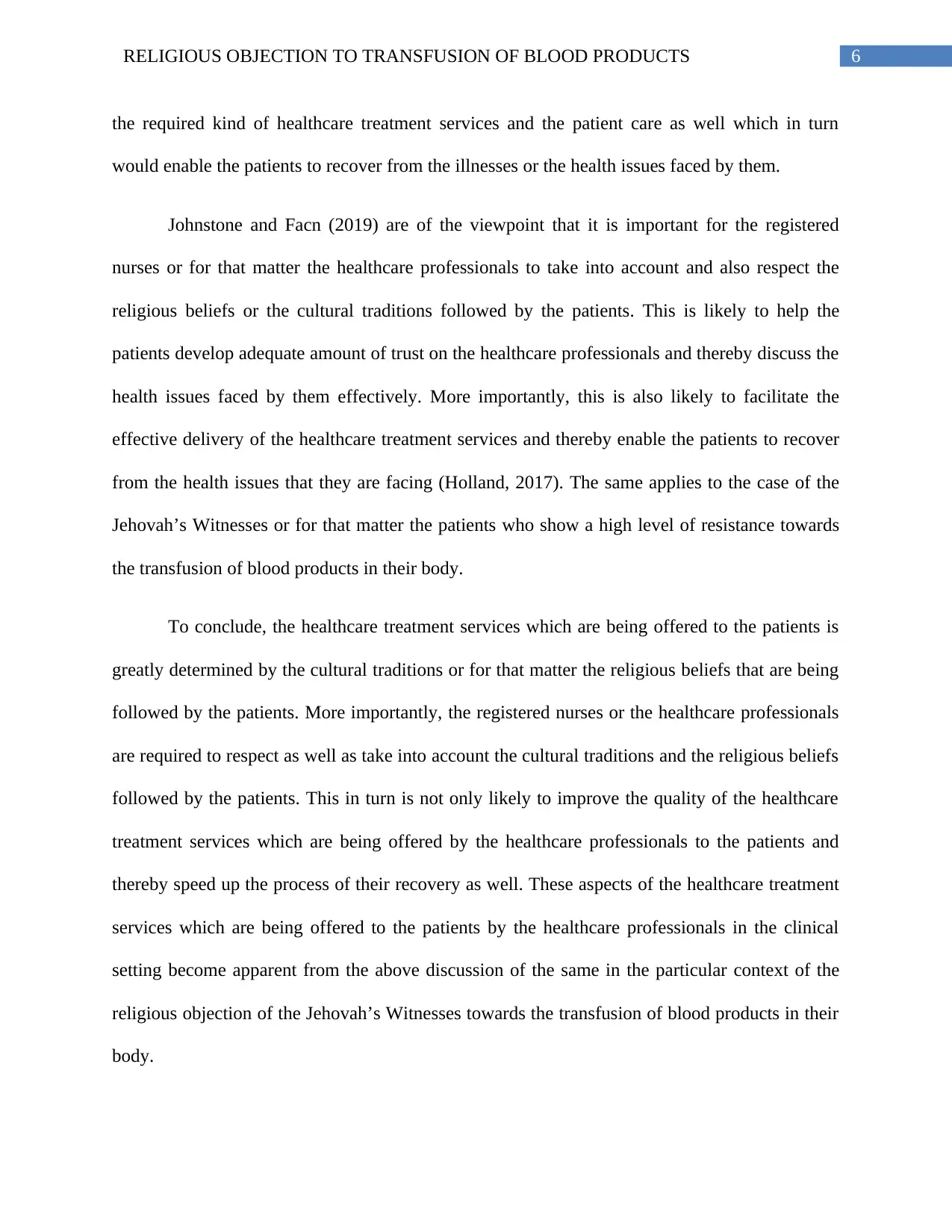
6RELIGIOUS OBJECTION TO TRANSFUSION OF BLOOD PRODUCTS
the required kind of healthcare treatment services and the patient care as well which in turn
would enable the patients to recover from the illnesses or the health issues faced by them.
Johnstone and Facn (2019) are of the viewpoint that it is important for the registered
nurses or for that matter the healthcare professionals to take into account and also respect the
religious beliefs or the cultural traditions followed by the patients. This is likely to help the
patients develop adequate amount of trust on the healthcare professionals and thereby discuss the
health issues faced by them effectively. More importantly, this is also likely to facilitate the
effective delivery of the healthcare treatment services and thereby enable the patients to recover
from the health issues that they are facing (Holland, 2017). The same applies to the case of the
Jehovah’s Witnesses or for that matter the patients who show a high level of resistance towards
the transfusion of blood products in their body.
To conclude, the healthcare treatment services which are being offered to the patients is
greatly determined by the cultural traditions or for that matter the religious beliefs that are being
followed by the patients. More importantly, the registered nurses or the healthcare professionals
are required to respect as well as take into account the cultural traditions and the religious beliefs
followed by the patients. This in turn is not only likely to improve the quality of the healthcare
treatment services which are being offered by the healthcare professionals to the patients and
thereby speed up the process of their recovery as well. These aspects of the healthcare treatment
services which are being offered to the patients by the healthcare professionals in the clinical
setting become apparent from the above discussion of the same in the particular context of the
religious objection of the Jehovah’s Witnesses towards the transfusion of blood products in their
body.
the required kind of healthcare treatment services and the patient care as well which in turn
would enable the patients to recover from the illnesses or the health issues faced by them.
Johnstone and Facn (2019) are of the viewpoint that it is important for the registered
nurses or for that matter the healthcare professionals to take into account and also respect the
religious beliefs or the cultural traditions followed by the patients. This is likely to help the
patients develop adequate amount of trust on the healthcare professionals and thereby discuss the
health issues faced by them effectively. More importantly, this is also likely to facilitate the
effective delivery of the healthcare treatment services and thereby enable the patients to recover
from the health issues that they are facing (Holland, 2017). The same applies to the case of the
Jehovah’s Witnesses or for that matter the patients who show a high level of resistance towards
the transfusion of blood products in their body.
To conclude, the healthcare treatment services which are being offered to the patients is
greatly determined by the cultural traditions or for that matter the religious beliefs that are being
followed by the patients. More importantly, the registered nurses or the healthcare professionals
are required to respect as well as take into account the cultural traditions and the religious beliefs
followed by the patients. This in turn is not only likely to improve the quality of the healthcare
treatment services which are being offered by the healthcare professionals to the patients and
thereby speed up the process of their recovery as well. These aspects of the healthcare treatment
services which are being offered to the patients by the healthcare professionals in the clinical
setting become apparent from the above discussion of the same in the particular context of the
religious objection of the Jehovah’s Witnesses towards the transfusion of blood products in their
body.
Paraphrase This Document
Need a fresh take? Get an instant paraphrase of this document with our AI Paraphraser
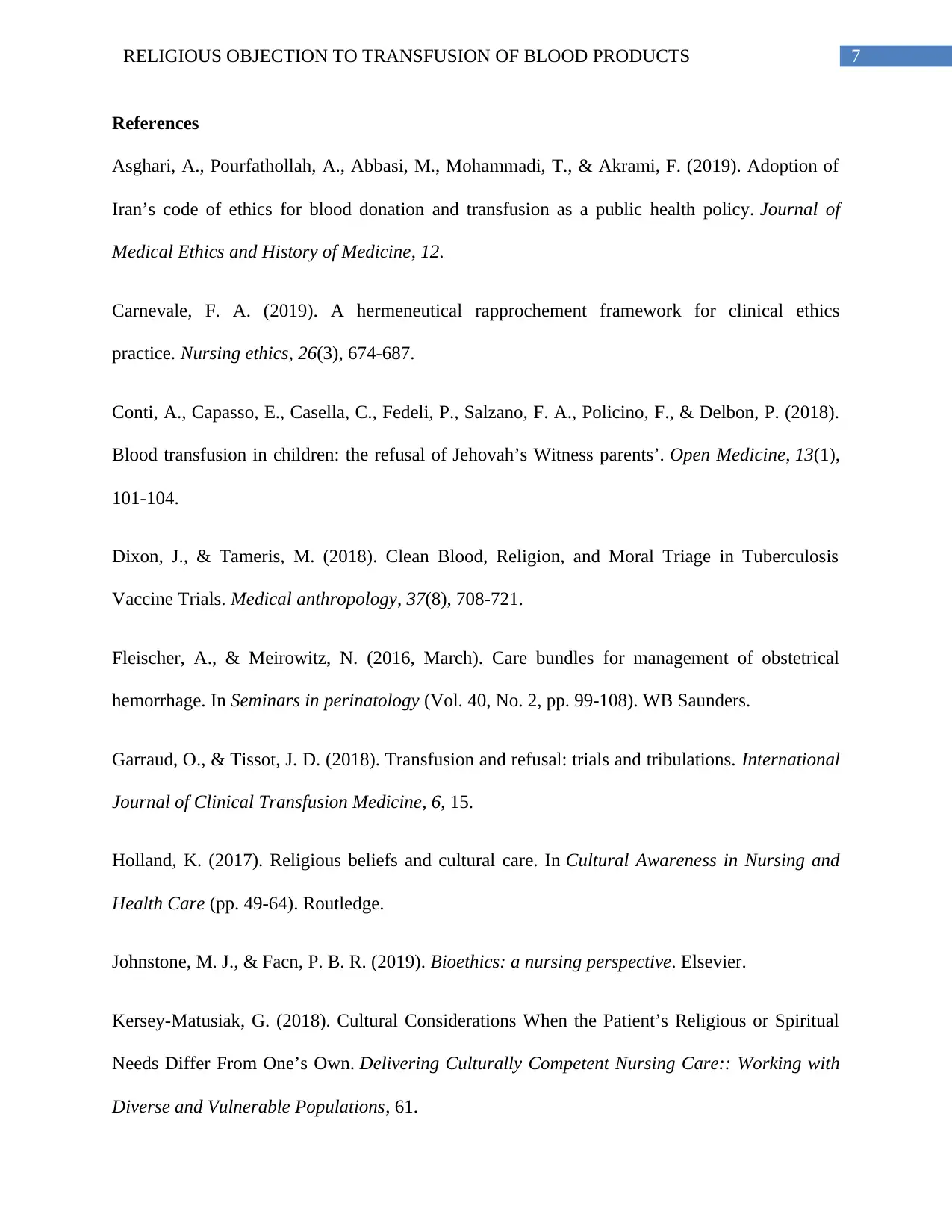
7RELIGIOUS OBJECTION TO TRANSFUSION OF BLOOD PRODUCTS
References
Asghari, A., Pourfathollah, A., Abbasi, M., Mohammadi, T., & Akrami, F. (2019). Adoption of
Iran’s code of ethics for blood donation and transfusion as a public health policy. Journal of
Medical Ethics and History of Medicine, 12.
Carnevale, F. A. (2019). A hermeneutical rapprochement framework for clinical ethics
practice. Nursing ethics, 26(3), 674-687.
Conti, A., Capasso, E., Casella, C., Fedeli, P., Salzano, F. A., Policino, F., & Delbon, P. (2018).
Blood transfusion in children: the refusal of Jehovah’s Witness parents’. Open Medicine, 13(1),
101-104.
Dixon, J., & Tameris, M. (2018). Clean Blood, Religion, and Moral Triage in Tuberculosis
Vaccine Trials. Medical anthropology, 37(8), 708-721.
Fleischer, A., & Meirowitz, N. (2016, March). Care bundles for management of obstetrical
hemorrhage. In Seminars in perinatology (Vol. 40, No. 2, pp. 99-108). WB Saunders.
Garraud, O., & Tissot, J. D. (2018). Transfusion and refusal: trials and tribulations. International
Journal of Clinical Transfusion Medicine, 6, 15.
Holland, K. (2017). Religious beliefs and cultural care. In Cultural Awareness in Nursing and
Health Care (pp. 49-64). Routledge.
Johnstone, M. J., & Facn, P. B. R. (2019). Bioethics: a nursing perspective. Elsevier.
Kersey-Matusiak, G. (2018). Cultural Considerations When the Patient’s Religious or Spiritual
Needs Differ From One’s Own. Delivering Culturally Competent Nursing Care:: Working with
Diverse and Vulnerable Populations, 61.
References
Asghari, A., Pourfathollah, A., Abbasi, M., Mohammadi, T., & Akrami, F. (2019). Adoption of
Iran’s code of ethics for blood donation and transfusion as a public health policy. Journal of
Medical Ethics and History of Medicine, 12.
Carnevale, F. A. (2019). A hermeneutical rapprochement framework for clinical ethics
practice. Nursing ethics, 26(3), 674-687.
Conti, A., Capasso, E., Casella, C., Fedeli, P., Salzano, F. A., Policino, F., & Delbon, P. (2018).
Blood transfusion in children: the refusal of Jehovah’s Witness parents’. Open Medicine, 13(1),
101-104.
Dixon, J., & Tameris, M. (2018). Clean Blood, Religion, and Moral Triage in Tuberculosis
Vaccine Trials. Medical anthropology, 37(8), 708-721.
Fleischer, A., & Meirowitz, N. (2016, March). Care bundles for management of obstetrical
hemorrhage. In Seminars in perinatology (Vol. 40, No. 2, pp. 99-108). WB Saunders.
Garraud, O., & Tissot, J. D. (2018). Transfusion and refusal: trials and tribulations. International
Journal of Clinical Transfusion Medicine, 6, 15.
Holland, K. (2017). Religious beliefs and cultural care. In Cultural Awareness in Nursing and
Health Care (pp. 49-64). Routledge.
Johnstone, M. J., & Facn, P. B. R. (2019). Bioethics: a nursing perspective. Elsevier.
Kersey-Matusiak, G. (2018). Cultural Considerations When the Patient’s Religious or Spiritual
Needs Differ From One’s Own. Delivering Culturally Competent Nursing Care:: Working with
Diverse and Vulnerable Populations, 61.
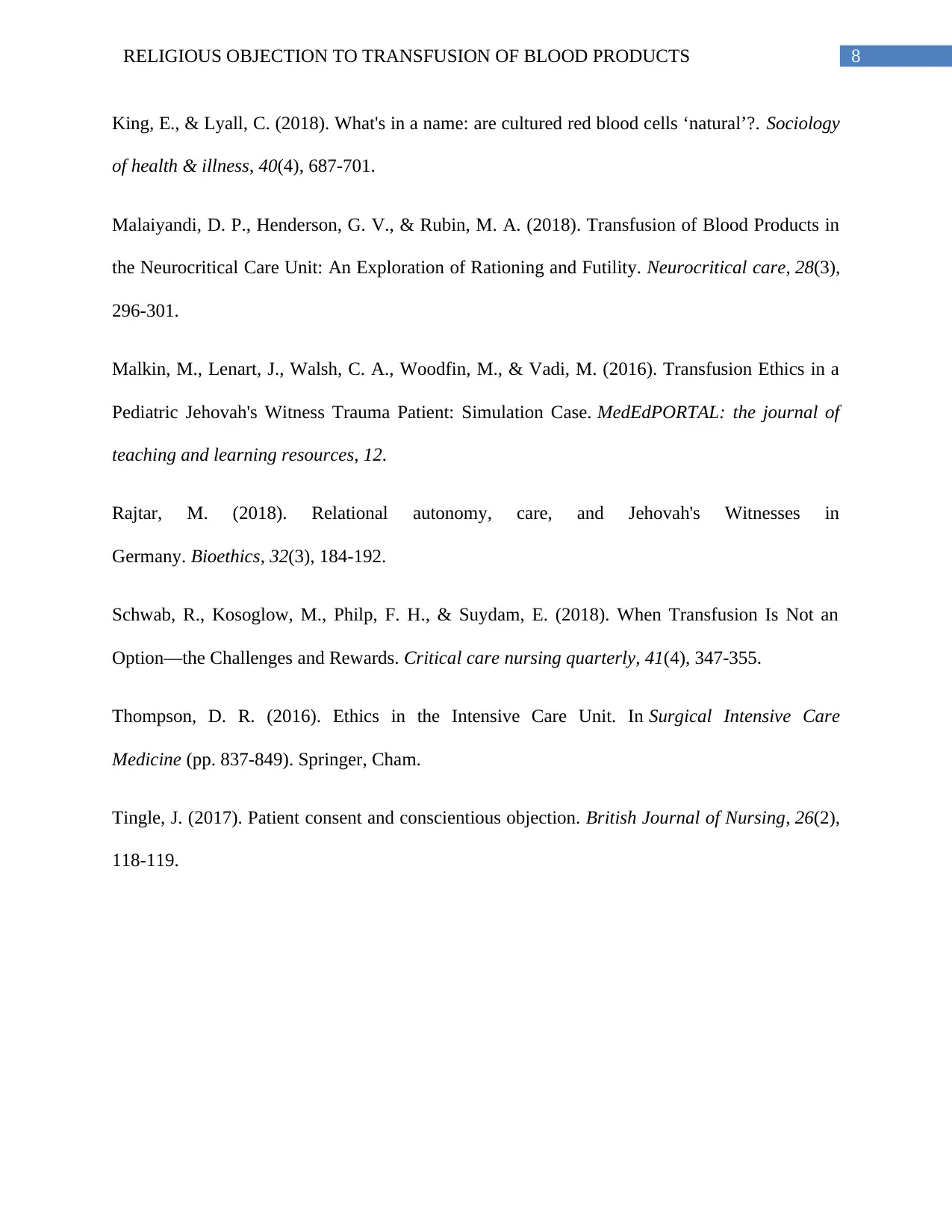
8RELIGIOUS OBJECTION TO TRANSFUSION OF BLOOD PRODUCTS
King, E., & Lyall, C. (2018). What's in a name: are cultured red blood cells ‘natural’?. Sociology
of health & illness, 40(4), 687-701.
Malaiyandi, D. P., Henderson, G. V., & Rubin, M. A. (2018). Transfusion of Blood Products in
the Neurocritical Care Unit: An Exploration of Rationing and Futility. Neurocritical care, 28(3),
296-301.
Malkin, M., Lenart, J., Walsh, C. A., Woodfin, M., & Vadi, M. (2016). Transfusion Ethics in a
Pediatric Jehovah's Witness Trauma Patient: Simulation Case. MedEdPORTAL: the journal of
teaching and learning resources, 12.
Rajtar, M. (2018). Relational autonomy, care, and Jehovah's Witnesses in
Germany. Bioethics, 32(3), 184-192.
Schwab, R., Kosoglow, M., Philp, F. H., & Suydam, E. (2018). When Transfusion Is Not an
Option—the Challenges and Rewards. Critical care nursing quarterly, 41(4), 347-355.
Thompson, D. R. (2016). Ethics in the Intensive Care Unit. In Surgical Intensive Care
Medicine (pp. 837-849). Springer, Cham.
Tingle, J. (2017). Patient consent and conscientious objection. British Journal of Nursing, 26(2),
118-119.
King, E., & Lyall, C. (2018). What's in a name: are cultured red blood cells ‘natural’?. Sociology
of health & illness, 40(4), 687-701.
Malaiyandi, D. P., Henderson, G. V., & Rubin, M. A. (2018). Transfusion of Blood Products in
the Neurocritical Care Unit: An Exploration of Rationing and Futility. Neurocritical care, 28(3),
296-301.
Malkin, M., Lenart, J., Walsh, C. A., Woodfin, M., & Vadi, M. (2016). Transfusion Ethics in a
Pediatric Jehovah's Witness Trauma Patient: Simulation Case. MedEdPORTAL: the journal of
teaching and learning resources, 12.
Rajtar, M. (2018). Relational autonomy, care, and Jehovah's Witnesses in
Germany. Bioethics, 32(3), 184-192.
Schwab, R., Kosoglow, M., Philp, F. H., & Suydam, E. (2018). When Transfusion Is Not an
Option—the Challenges and Rewards. Critical care nursing quarterly, 41(4), 347-355.
Thompson, D. R. (2016). Ethics in the Intensive Care Unit. In Surgical Intensive Care
Medicine (pp. 837-849). Springer, Cham.
Tingle, J. (2017). Patient consent and conscientious objection. British Journal of Nursing, 26(2),
118-119.
⊘ This is a preview!⊘
Do you want full access?
Subscribe today to unlock all pages.

Trusted by 1+ million students worldwide
1 out of 9
Related Documents
Your All-in-One AI-Powered Toolkit for Academic Success.
+13062052269
info@desklib.com
Available 24*7 on WhatsApp / Email
![[object Object]](/_next/static/media/star-bottom.7253800d.svg)
Unlock your academic potential
Copyright © 2020–2025 A2Z Services. All Rights Reserved. Developed and managed by ZUCOL.





